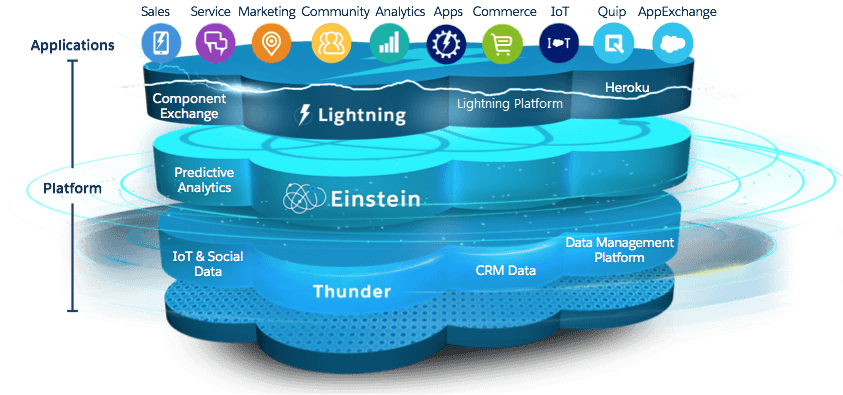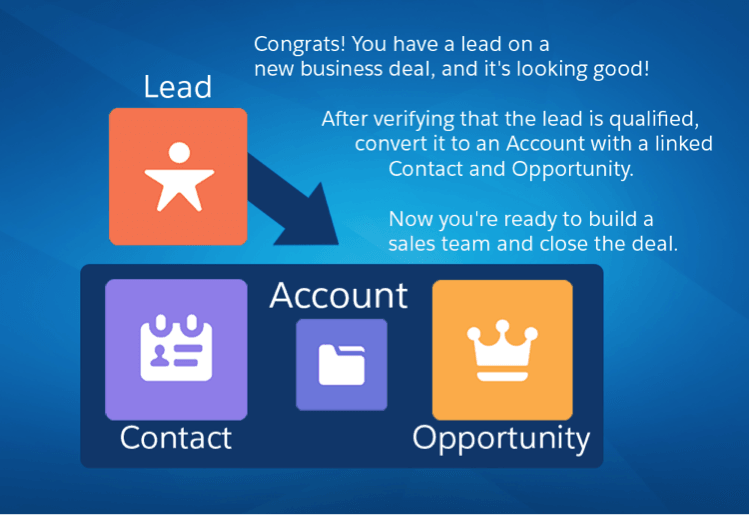Select your language
Blog
Dive into the world of Marketing Automation:
Practical & helpful knowledge that makes your daily life with Marketing Automation easier!
Salesforce – To get a clear view in the jungle of terms
IT infrastructure that is made available via a computer network.
The Salesforce world has a complex structure and terminology that uses the same terms over and over again.
These Salesforce terms will be clearer after this blog article:
- About the Salesforce architecture: CRM, Sales Cloud, Service Cloud, Marketing Cloud, Community Cloud, Commerce Cloud, Quip, AppExchange, Account Engagement(Pardot), Heroku, Einstein
- To organize the data: database, object, records, fields, application, organization, reports, dashboards
- Other terms: sandbox instances, API, Salesforce Lightning Experience vs. Salesforce Classic
1. About the Salesforce architecture
With a CRM (Customer Relationship Management) your company can systematically design the relationship & interaction with the customers. The core function is to maintain the relationship with current and potential customers, to be able to care for them and to orientate itself as a company consistently towards its customers. It also allows you to track the data of all interactions with the potential & current customers. The data is securely stored in the cloud.
Sales Cloud is a part of the Salesforce CRM system designed specifically for sales. Through the Sales Cloud, all information about your customers is concentrated in one place, giving you an in-depth view of your customers. Your company can use it to get real-time reports on how business is developing and you can be intelligently informed about the best leads.
Service Cloud as another part of the CRM system, is an easy-to-use customer service application. The core function is to provide a professional & customer friendly service that can be tracked.
A digital environment connected to your CRM system to retain customers & support partners is the Community Cloud. Typical use cases are customer service & account portals or partner relationship management & sales channels.
Through the Commerce Cloud you can set up e-commerce solutions for B2C customers as well as B2B customers. Examples are online shop and merchandising. You can integrate Salesforce CRM data from the Service Cloud, Sales Cloud & Community Cloud.
For marketing automation, the Marketing Cloud is the heart of Salesforce. It allows a company to see the customer in all different phases of the customer lifecycle. In marketing, sales, retail, and service. In addition, you can get in touch with your customers individually and personalized on all different channels your company uses.
The Marketing Cloud itself consists of different products as well: Email Studio, Interaction Studio, Journey Builder, Mobile Studio, Advertising Studio, Audience Studio, Data Studio, Social Studio, Datorama & Google Analytics 360. If you want to know more about the setup of the Marketing Cloud, you can read here (link to First Experiences with Salesforce) or find out more about the products here (link to Jordys Blog). In combination with Salesforce you have a complete CRM. Through this combination, there are countless other possibilities for automation, customization and management of your own data. But the Marketing Cloud can also be used as a marketing automation solution without the CRM from Salesforce.
Salesforce also offers a solution for B2B marketing automation. With Account Engagement you can automate your marketing activities, bring together the marketing & sales department & improve collaboration. Account Engagement helps you channel your visitors & potential customers through a sales funnel to convert a customer demand into a qualified lead.
Quip provides an intelligent, cloud-based collaboration platform within Salesforce. Teams can create & discuss content faster. Changes are visible live. Work can be done from any device in a central location in the cloud. It's also optimized for use on mobile devices.
The AppExchange is an integrated App Store in Salesforce. Apps can be installed for free or for a fee.
With Heroku you can deploy, run, manage & scale applications for your customers using open source languages (e.g. Java, Ruby, PHP, Phyton, Go, Node.js). These apps are connected to Salesforce.
Einstein is a smart CRM wizard that can be integrated with Salesforce. This platform technology allows you to create customized forecasts based on the data. Einstein adds Artificial Intelligence to all Salesforce applications.
"For Marketing Automation the Marketing Cloud is the heart of Salesforce. It allows a company to get a picture of its customers at all different stages of the customer lifecycle."
2. To organize the data
A database in Salesforce is a huge spreadsheet with stored information that can be accessed later.
Objects represent the tables in the Salesforce database that store a particular type of information (data). There are custom objects and standard objects such as accounts, contacts, leads, and opportunities.
In the accounts, the companies or persons with whom business is conducted are stored. Contacts show the employees of an account. It's important for the accounts, as well as for the contacts, that certain naming conventions apply in the company. In addition, the data records must be constantly renewed in order to add new information and to delete old or inactive contacts. As soon as an opportunity is created, an account & a contact is also created.
Leads are persons or companies that are potential customers. This means that there is interest in your company. With the stored information about the leads, marketing campaigns can be better tracked & targeted. In addition, the data allows you to focus on those deals that are most likely to be closed. And as the saying goes. What we focus on, more of that will be...
A lead can be turned into an opportunity as soon as certain criteria are met. These show that there is a high probability that a business transaction will be created, that there is a "purchase" intention of the customer. However, you can determine the criteria for this qualification for your company. Thus, opportunities are qualified leads with a high probability of a deal.
From the first contact with your company to the conclusion of a purchase, a customer goes on a short journey, also called a customer journey. Once a customer is interested, a lead is created. As soon as the customer meets the criteria, the lead is converted into an opportunity and an account & contact is created. The opportunity remains until a deal is successfully completed or otherwise closed.
3. Other terms
Sandbox instances are copies of your organization in a separate environment. They are used for development & testing.
The main task of an API is to connect different parts of software so that they can exchange information. For example, the platform automatically creates an API name when a custom field or object is added. This API name allows Salesforce to retrieve that metadata & data elsewhere in the platform. This allows you to directly access a contact's Name field when you create an email using the API Name.
Switch between user interfaces: Salesforce Lightning Experience is the productive user interface in which all new Salesforce innovations are implemented. These are the pages in Salesforce that are optimized for sales purposes. Salesforce Classic is the older version of the user interface. Many Lightning Experience enhancements are not available in Classic, while some features from Classic are not yet supported in Lightning Experience. Therefore you can switch between these two user interfaces with a toggle.
By looking at the different terms, you can see how many possible applications there are with the different products in Salesforce. Depending on your company's needs & requirements, you can put together the right products. For example, if you are looking for a solution for marketing automation in your company, you can choose the product of the Marketing Cloud in combination with Salesforce CRM or without CRM and you won't need the whole package of Salesforce.
Would you like to know more about it? Subscribe to our newsletter to stay up-to-date on the most exciting topics in marketing automation or send us your questions.
to automate & personalize your marketing.








